 Despite being an multi-Academy Award nominated film (Screenplay Virginia Kellogg, Supporting Actress Hope Emerson, and Best Actress Eleanor Parker), this film has been relegated to the Cult Camp Classics label by Warner Brothers on DVD. I wasn’t sure what to expect. I’ve had problems in the past with the “camp” signifier, especially for films not necessarily intended as such. Though this apparently was originally envisioned as a Bette Davis/Joan Crawford vehicle to be titled The Big Cage (according to IMDB), I don’t see much of that carrying over in its finished incarnation (though imagining Davis as the inmate and Crawford as the warden, or vice-versa, makes me want to see that movie!). There are plenty of moments of heightened acting in this film, and the most blatant Sapphic references of probably any Hollywood picture of its time, but it seems to play it quite straight most of the time. Maybe some of the more sober moments come out of give-and-take rewrites with the studio over its wavering morality messages? This is a picture that aims to depict the seediness in the Women’s Prison, while introducing the idea of needed reform. Though, I noticed with interest how blatantly the film suggests that a lack of progress in this area comes specifically from a divide in gender. Men hold the power and they are ignorant of its uses and abuses. While its Prison Matron Harper is portrayed as a corrupt power hog, indoctrinated into the male idea of abusive punishment as a kind of reinforced subservience, Agnes Moorehead‘s Warden Benton fights for a more humane approach to reform and rehabilitation (that I suppose can be coded ‘feminine’, since it is the marginalized one?). It is a clichéd dichotomy at this point, though I don’t know how novel it was for the genre at the time. The interesting part is the defeatist attitude the picture allows of itself. The coda to the film, while functioning as a bit of a Code-inspired justice tag, paints a rather bleak picture of the Warden’s progressive mindset. Bottom line: It is a borderline B-picture, but a B-picture elevated by the talent involved.
Despite being an multi-Academy Award nominated film (Screenplay Virginia Kellogg, Supporting Actress Hope Emerson, and Best Actress Eleanor Parker), this film has been relegated to the Cult Camp Classics label by Warner Brothers on DVD. I wasn’t sure what to expect. I’ve had problems in the past with the “camp” signifier, especially for films not necessarily intended as such. Though this apparently was originally envisioned as a Bette Davis/Joan Crawford vehicle to be titled The Big Cage (according to IMDB), I don’t see much of that carrying over in its finished incarnation (though imagining Davis as the inmate and Crawford as the warden, or vice-versa, makes me want to see that movie!). There are plenty of moments of heightened acting in this film, and the most blatant Sapphic references of probably any Hollywood picture of its time, but it seems to play it quite straight most of the time. Maybe some of the more sober moments come out of give-and-take rewrites with the studio over its wavering morality messages? This is a picture that aims to depict the seediness in the Women’s Prison, while introducing the idea of needed reform. Though, I noticed with interest how blatantly the film suggests that a lack of progress in this area comes specifically from a divide in gender. Men hold the power and they are ignorant of its uses and abuses. While its Prison Matron Harper is portrayed as a corrupt power hog, indoctrinated into the male idea of abusive punishment as a kind of reinforced subservience, Agnes Moorehead‘s Warden Benton fights for a more humane approach to reform and rehabilitation (that I suppose can be coded ‘feminine’, since it is the marginalized one?). It is a clichéd dichotomy at this point, though I don’t know how novel it was for the genre at the time. The interesting part is the defeatist attitude the picture allows of itself. The coda to the film, while functioning as a bit of a Code-inspired justice tag, paints a rather bleak picture of the Warden’s progressive mindset. Bottom line: It is a borderline B-picture, but a B-picture elevated by the talent involved.
IMDB points out that Eleanor Parker’s role here is the tenth that John Cromwell directed to a Best Actress nomination. Though I haven’t seen much of her work (and when I have, like in The Sound of Music, I didn’t know who she was), she is clearly an interesting ingenue. I think I first admired her in The Man With the Golden Arm (in which she is crazily magnificent) and later in The Naked Jungle (a decent Charlton Heston action-adventurer that the last Indiana Jones film stole its ‘ant scene’ from). She is clearly over-the-top in some scenes, but even here her performance is spectacularly accomplished. It all serves the material and the film is better for the presence she brings to it. And not just because of the ‘haircut scene’. I wonder whether her or Cromwell might have seen Dreyer’s Passion of Joan of Arc (I’m not sure how available it was before being discovered in that Norwegian Mental Ward closet in 1981). It’s been a few days now since I’ve seen this film, and I am still impressed (which is why I felt compelled to write something about it).
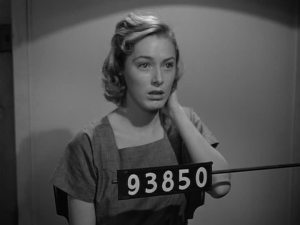

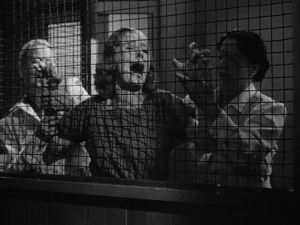
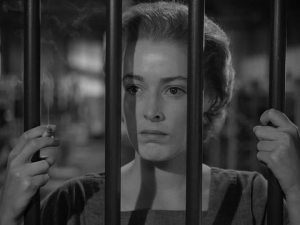

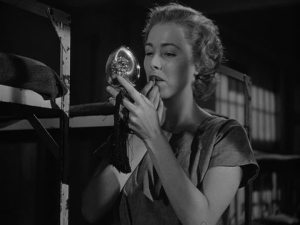
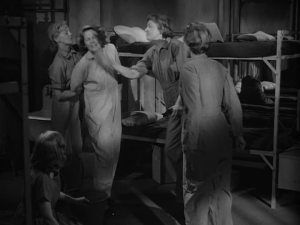





0 Responses to “Caged (1950)”